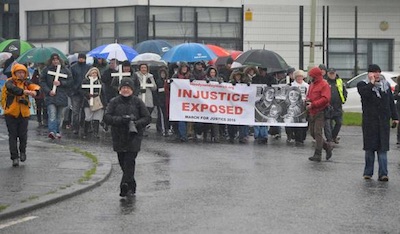
Several thousand people took part in a rain-soaked march in Derry last weekend to mark the 44th anniversary of the Bloody Sunday killings.
Headed by people carrying 14 large white crosses and photographs of those killed when British paratroopers opened fire on the anti-internment march on 30 January 1972, those taking part made their way through the Creggan, Brandywell and Bogside areas to Free Derry Corner for a rally.
They recalled the 30 minutes when British paratroopers shot dead 13 men, and left another fatally wounded, most by deliberately aimed single shots.
Speaking from the platform Kate Nash, one of the organisers whose brother William was one of those shot dead, gave an update on the ongoing PSNI murder investigation into the killings.
She said questioning of former soldiers, which was to begin within weeks, could take months. “Knowing the PSNI the way I do, it may take a whole bit longer, however we remain hopeful that we might get soldiers into court,” she said.
The main speaker Eamon McCann, a prominent civil and human rights campaigner, told those present that “Bloody Sunday is unfinished business”.
Praising those who continued to organise the annual march, he said: “The Bloody Sunday campaign will be here for many years to come to stand, not just for the cause of justice and peace in relation to Bloody Sunday, but to see that is emblematic of campaigns of all over the world for truth in the face of murder by the State.”
Five thousand people braved incessant rain, wind and cold to hear him speak.
Addressing the issue of the continuation of the rally after the release of the findings of the Saville Report in 2010 into the killings of Bloody Sunday, McCann said: “After five years it is perfectly clear who was on the right side about whether we continue to march or not. More and more families have come forward and spoken out and demanded the truth and have said ‘we are not satisfied.’”
He said the Bloody Sunday campaign had endured because the state must be held to account when it kills innocent civilians. “This is not something to be bargained away; it is not a matter for negotiation. It is not a bargaining chip to be offered in negotiations in any sort of deal at all.”

‘DOUBLE STANDARDS’
In a statement read out a remembrance service on Saturday to mark the moment of the 44th anniversary of the 1972 killings, the families rejected calls, most recently by Fianna Fail TD Eamon O Cuiv, for the killers to receive an amnesty.
“Unionist politicians, sections of the Right Wing British press and former British officers have all tried to belittle our cause and called for an end to the investigation - this is to imply our losses and our dead are somehow less than others and not worthy of a proper investigation,” they said.
“We call on them here today to end their hypocrisy and double standards - but even with these delaying tactics we have arrived at a stage where we can see prosecutions in the near future
“Those who oppose us can only delay us for so long and as we have proved time and time again, we will simply not go away because they want us to - but we will see this through and we will see the killers in court.
“And we say to the PSNI, just get on with it, bring these murderers to justice, time is of the essence - it is time for justice for Bloody Sunday.”
‘SICK’
Meanwhile, the brother of a man shot dead on Bloody Sunday has described as “sick” comments by flag protest organisers celebrating the deaths.
The Loyal Peoples Protest, the group behind a 12-hour Union flag ‘vigil’ planned for Belfast City Hall on St Patrick’s Day, posted an image online of the wounded with the caption: “Paras 14 Republicans 0. Enjoy your day, we did.”
The comments appeared on Facebook on the same day that marchers gathered in Derry to mark the 44th anniversary of the killings.
John Kelly, whose 17-year-old brother Michael was one of the 14 people who died on Bloody Sunday, said it was “typical of the things that happen at this time of year”.
“These were 14 innocent people who lost their lives, it doesn’t matter what side of the community you come from. It certainly falls in with their sick mindset when they put up these disgusting remarks.”
Mr Kelly added: “It is sadly part and parcel of what we have to face. We believe these people are sick in the head. It goes right back to 1972 when the families received anonymous letters, hate-mongering and sectarian, from the likes of the UVF and others.”
![[Irish Republican News]](https://republican-news.org/graphics/title_gifs/rn.gif)
![[Irish Republican News]](https://republican-news.org/graphics/title_gifs/harp.gif)

